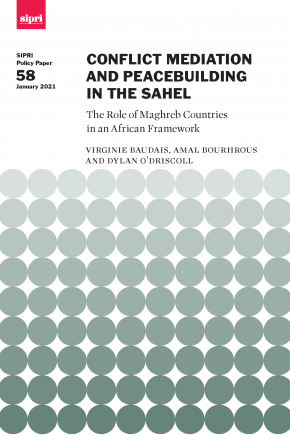Conflict Mediation and Peacebuilding in the Sahel: The Role of Maghreb Countries in an African Framework

Conflict dynamics in the Sahel are complex. The region faces a multidimensional crisis that includes the proliferation of terrorist groups, criminal networks, environmental pressures, state weaknesses and severe governance problems. In addition to this internal context, the Sahel crisis has been affected by external factors, such as the fall of Muammar Gaddafi and the civil war in Libya. Its deeper causes can be found in the structural factors of fragility in the sociopolitical dynamics of internal divisions, serial uprisings and weak states. Having started as a largely Malian conflict, the crisis now affects the whole Sahel region and, despite the deployment of military and security operations, it continues to get worse. A new approach is needed.
The authors of this Policy Paper identify regionally and locally driven solutions as one such way to support development and promote peace. They highlight how stronger involvement of the Maghreb countries that share borders with the crisis-affected countries to their south could be a critical factor in building the foundations of stability and starting to meet longer-term development objectives. Given their engagement with Sahel crises in the past and the multiple linkages that connect the two regions, the role of these countries—and especially Algeria and Morocco—could be pivotal. Despite challenges, African-led initiatives are perceived to be more legitimate and to have a deeper understanding of local contexts. The authors thus recommend that the African Union, with its emphasis on endeavouring to bring ‘African solutions to African problems’, provides the framework for coordinated action in the Sahel.
This paper offers a fresh assessment of the situation in the Sahel in the context of relations with neighbouring Maghreb countries. The authors’ insightful analysis and recommendations will be of interest to policymakers in Africa, in Europe and elsewhere, as well as to local actors and other stakeholders involved in mediation and peacebuilding efforts in the Sahel.
1. Introduction
2. The crisis in the Sahel: From domestic rebellions to regional destabilization
3. The Maghreb and the Sahel
4. The peacekeeping, peacebuilding and security architecture
5. A different approach to the Sahel: Greater coordination and local peacebuilding
6. Conclusions and recommendations


